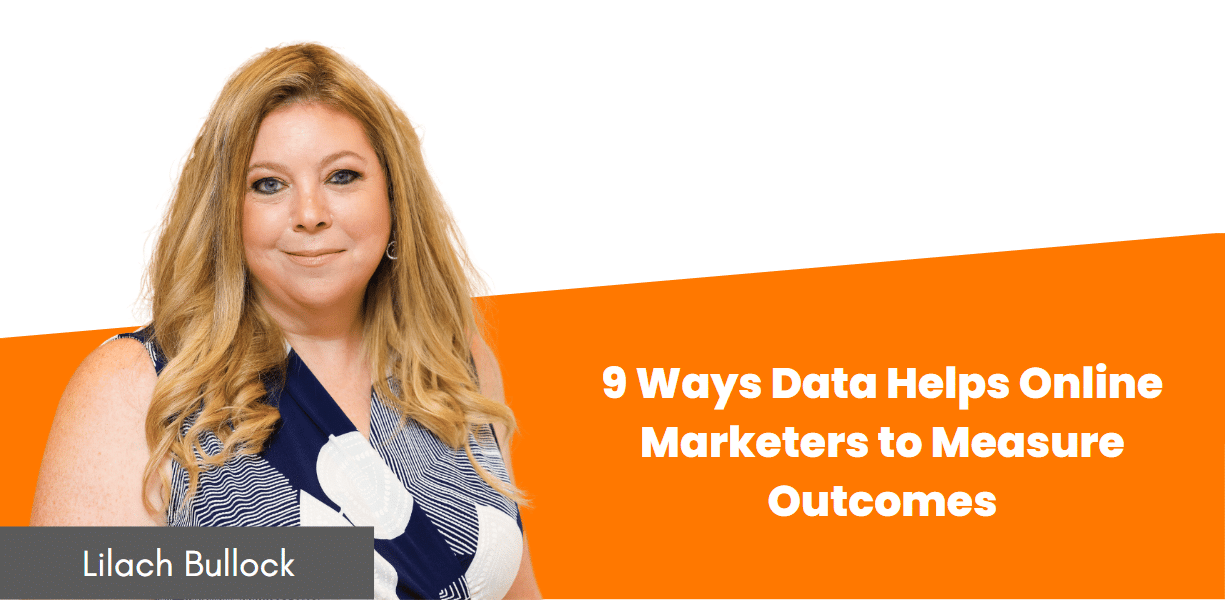Follow Lilach

9 Ways Data Helps Online Marketers to Measure Outcomes
You’d think that the only effective way to measure the success of digital marketing campaigns is Leads & Sales, but that’s not true. Data is more accessible than ever, and with that comes the evidence of whether the marketing endeavours are successful or not.
A successful campaign can be determined by many more metrics. Try asking yourself questions to get the answers-
- Do I want a higher email click-through rate?
- Do I need to drive more organic traffic to the platform?
- Should I aim to reduce the drop-off percentage from the landing page?
The answers to all these questions are an analytic metric that you can track and analyze over a period of time. These metrics and can help you track and guide your campaigns for lead conversion, sales, and branding.
Data is inevitable in marketing and to show the clients and leaders the evidence of your campaigns, detailed measuring metrics are required. Everything that marketers do needs to have a measurable ROI attached because if you’re unable to show the revenue that you’re driving from the marketing campaigns then you could be running a risk of losing your clients. Revenue here needs not necessarily be monetary; it could be leads, sign-ups or referrals.
Using analytics and data to prove marketing performance is not new; marketers have been using metrics to track campaign performances for a long time. The point is that metrics in isolation do not stand out, but they’re important in the larger context, like the goals aligned with the company’s growth.
In recent years, with the shift to digital, more and more of the activities that marketing teams engage in have become measurable. What’s more, data has become increasingly easy to work with, so it’s emerged as a bigger part of management practices at companies of all types. Indeed, data-driven decision making is now the standard in business, so if you’re going to please the stakeholders who matter at your company or at your clients’ companies, then you’ll need good solutions in place for measuring and reporting on the impact of your marketing efforts.
Here are some common marketing metrics that can simplify the process of measuring outcomes for marketers.
9 Ways Data Helps Online Marketers to Measure Outcomes

1. Overall Website Traffic
Significant changes in the visitors of website traffic indicate how the digital marketing campaign is performing and tracking the source can identify which part of the campaign is responsible for driving the traffic. Don’t restrict yourself to looking only at the pageviews, check how many unique visitors have landed on your webpage because more unique views mean more potential customers.
2. Mobile Traffic
Mobile internet is a strong digital marketing play area as the increasing amount of mobile device usage indicates the need for a fully responsive website. This metric opens up whole new dimensions and window of opportunities for marketers to find new sources for their marketing campaigns. Example: notifications & text messages.
3. Click-Through Rate (CTR)
This is an effective metric to measure the performance of your paid ads. Search and display ads are very common, thus generating traffic from them is a competitive sport. CTR defines the ratio of the number of impression i.e. number of times the ad has appeared on someone’s screen to total clicks on the ad. A simple ratio of impressions vs. clicks, the higher the number, the better the performance of your ad.
4. Cost per Click (CPC)
CPC defines how much you are gonna pay every time an internet user clicks on your ad. The price depends on the popularity of the keyword, the quality score of the ad and other factors. You can set the bid amount for each keyword individually or collectively.
5. Bounce Rate
You cannot expect that every visitor that lands on your website convert to a lead or customer. Your website might not align with your visitor’s thinking, on websites, some visitors immediately leave or bounce off, maybe because they found the content irrelevant, could be anything. This bouncing off is called the bounce rate. This metric can provide you insight on how and what to optimize your website for to decrease the bounce off.
6. Cost Per Lead (CPL)
CPL defines the ratio of lead conversion of a particular campaign to the cost spent for its execution. For any digital marketing campaign to succeed, your website and content should convert visitors into leads or customers. This metric makes it easy for owners and other leading stakeholders to measure how profitable their campaign is.
7. Conversion Rates (CVR)
Monitoring how many website visitors actually end up becoming a lead or a customer is called conversion rates (CVR). Your goal could be to get visitors’ email ids, to get them signed-up, or maybe gather any other pieces of information about the visitors. The conversion rates give the marketer the idea of what aspects of a digital marketing campaign is working for them.
8. Return of Investment (ROI)
ROI could be clearly calculated by measuring the number of visitors that become a paying customer i.e. source of revenue for the business. It helps businesses identify aspects of marketing that are driving sales and increasing revenues.
9. Customer Acquisition Cost (CAC)
After a period of initial marketing, CAC is measured by calculating the total cost of running and creating the campaigns for a period of time divided by the number of new customers acquired during that period. Calculations may not be perfect but it definitely gives insights into the digital marketing campaigns.
To Wrap Up
It is vital to understand that each metric that’s discussed above is a great indicator of the performance of your digital marketing campaigns; each metric has different value and focuses on a particular aspect of campaign, so it would be better to look at the metrics as a whole. The essential thing to note here is how well you can make use of the data extracted from these metrics. It provides an opportunity to evaluate what components of marketing work and what doesn’t, so you can establish improvement in those areas to make your digital marketing campaign profitable.
—————
About the Author:
 Lucy Manole is a creative content writer and strategist at Right Mix Marketing, an SEO-focused link building agency. She specializes in writing about digital marketing, technology, entrepreneurship, and education. When she is not writing or editing, she spends time reading books, cooking and traveling. You can connect with her on Twitter at @RightMixMktg
Lucy Manole is a creative content writer and strategist at Right Mix Marketing, an SEO-focused link building agency. She specializes in writing about digital marketing, technology, entrepreneurship, and education. When she is not writing or editing, she spends time reading books, cooking and traveling. You can connect with her on Twitter at @RightMixMktg
Other Social Links:
Facebook – https://www.facebook.com/
LinkedIn – https://www.linkedin.com/

Follow Lilach















